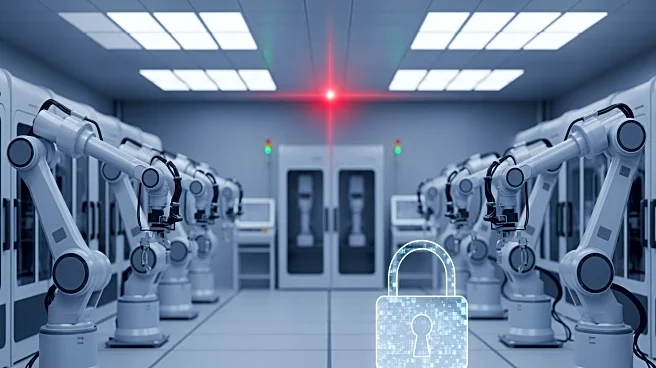What's Happening?
The pharmaceutical industry is experiencing a significant digital transformation with the integration of artificial intelligence (AI), the internet of things (IoT), and real-time analytics into manufacturing processes. This shift has led to smarter and more
efficient production floors, utilizing predictive maintenance and machine learning-enhanced inspections. However, this technological advancement has also introduced new cybersecurity risks. The interconnected nature of modern manufacturing systems, which now include enterprise resource planning systems, clinical data lakes, and cloud-native platforms, has expanded the attack surface for potential cyber threats. These threats can disrupt supply chains, delay product releases, and compromise drug quality, posing direct risks to patient safety.
Why It's Important?
The integration of AI and connected devices in pharmaceutical manufacturing has broadened the potential for cyberattacks, which can have severe financial and public health consequences. Documented incidents have shown that cyberattacks can lead to production shutdowns, delays in releasing temperature-sensitive biologics, and breaches of proprietary drug formulations. These events highlight the critical need for robust cybersecurity measures in the industry. As the sector continues to evolve, embedding security into AI-driven manufacturing platforms is essential to protect against these threats. This includes adopting zero trust architectures, securing AI pipelines, and enhancing workforce awareness to ensure that cybersecurity is a priority across all levels of the organization.
What's Next?
Looking ahead, the pharmaceutical industry is expected to advance towards digital twins, edge AI, and predictive analytics, which will further increase efficiency and agility but also expand the attack surface. To prepare for this future, organizations must embrace resilience as a core principle. This involves using AI to defend against AI-related threats, focusing on data-centric security, and evolving cryptographic approaches to withstand emerging threats. Continuous threat simulation and cross-domain collaboration will become standard practices to ensure ongoing resilience and security in manufacturing processes.
Beyond the Headlines
The ethical and legal implications of cybersecurity in pharmaceutical manufacturing are significant, as breaches can directly impact patient safety and global access to medicines. The industry must prioritize building secure-by-default systems that protect intellectual property and regulatory trust. By embedding cybersecurity as a design principle rather than a regulatory checkbox, organizations can lead with resilience and ensure the safety of patients worldwide.


















